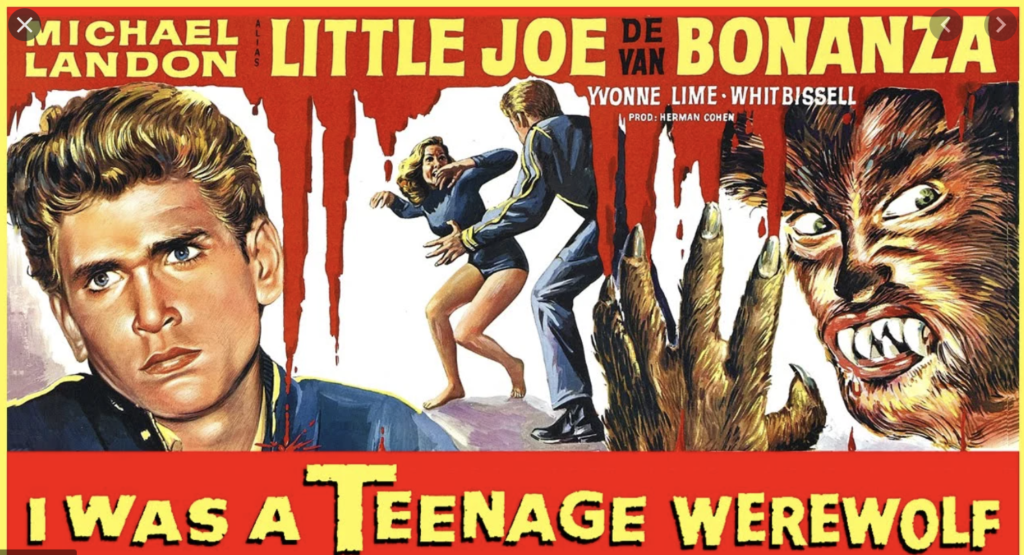“I’m going to TRANSFORM him, and unleash the savage instincts that lie hidden within… and then I’ll be judged the benefactor. Mankind is on the verge of destroying itself. The only hope for the human race is to hurl it back into its primitive norm, to start all over again. What’s one life compared to such a triumph?”
It’s important to remember that Dr. Brando meant well when he changed Tony Rivers into a teenage werewolf.
The 1950s were a time of unintended consequences and in some ways, those years changed our country for the worse.
Recently I’ve been thinking whimsically about where we went wrong, and what caused it as much as anything else. I asked Facebook friends to name one thing that didn’t exist 100 years ago but came along since then that had the biggest negative effect on our society.
There were some good answers.
Facebook.
Video games.
Nuclear weapons.
And one I would never have thought of — corn syrup.
Good answers all, but my own choice for something that changed us far and away for the worse is screens.
Screens? Do you love bugs that much?
Not those kind of screens. I’m talking about video screens small enough to fit inside homes and apartments. Movie screens were already around in 1920, so I’ll give them a pass. They’re not really part of the problem anyway.
No, the video screens I mean are mostly in your television set or your home computer.
They’re also in your smartphone.
And they’re rotting your brain.
Seriously. Numerous studies have shown that of all the ways we absorb information, watching television is the worst. The more television you watch, the more your brain changes and the more passive you become.
As for your computer, it serves to make us less able to concentrate and shortens our attention span. In his wonderful 2010 book “The Shallows: What the Internet is Doing to Our Brains,” Nicholas Carr posits that reading news stories — particularly on smartphones — makes you less likely to read the entire story.
When I was in London in 2009, it seemed like every other young person I saw was reading on their phones.
But of course it’s at home where screens have changed our lives the most. In the ’30s and much of the ’40s, people had radio, phonographs and some had pianos. The radio broadcasts were every bit as popular as TV shows were later, and on dramas or comedies, all you got was the sound.
You had to picture in your mind what the Shadow, or Eliot Ness or Henry Aldrich looked like. Kids learned how to use their imaginations, and they heard all sorts of different broadcasts.
And of course, radio didn’t broadcast 24 hours a day and there weren’t hundreds of different channels to choose from. It was a lot like TV in the ’50s, signing off after midnight and three channels. As comedian Jeff Foxworthy said, if the president was on, your night was shot.
I’m not sure when it was that television went over the edge. Was it the mid ’70s, when HBO came on the scene and there were uncut movies on your television? Or was it the early ’80s, when VCRs became popular and people were renting movies at the video store?
Whatever it was, people were watching a lot more television. The advent of DVDs made it even worse. All of a sudden someone could buy a boxed set and watch every episode of a show they loved.
What’s the you say? We haven’t even mentioned pornography yet.
Back in the ’80s, before DVDs, when videocassettes were primarily an overnight rental business, some estimates said 90 percent of actual sales were porn.
Eventually, surveys showed that the average American was spending 30 hours a week watching television.
That’s 30 hours a weekly that they weren’t doing things they used to do. More social things.
Computers made it even worse. Once they became popular in homes in the ’90s, people were spending hours in chat rooms and looking at all sorts of websites. And as computers became faster and more powerful, they were able to handle video games and movies.
Writer Neil Postman described it perfectly in his book when he said we were amusing ourselves to death.
You can certainly tell who is going to succeed in life and who isn’t by who spends all their spare time playing games and watching television and those who spend their time more productively. It’s why I’m so proud to see my brilliant daughter — a true overachiever — and her husband doing such a wonderful job of structuring their children’s days.
I know six children who will make the most of their talents.
As for our society, we obviously can’t get rid of television, the Internet, video games or any of the other things that go with them. The most important thing is to avoid falling into the trap ourselves.
As for the rest, it is what it is.

